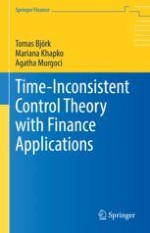2021 | OriginalPaper | Chapter
25. Time-Inconsistent Stopping Under Distorted Probabilities
Authors : Tomas Björk, Mariana Khapko, Agatha Murgoci
Published in: Time-Inconsistent Control Theory with Finance Applications
Publisher: Springer International Publishing
Activate our intelligent search to find suitable subject content or patents.
Select sections of text to find matching patents with Artificial Intelligence. powered by
Select sections of text to find additional relevant content using AI-assisted search. powered by
